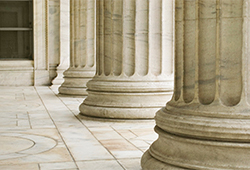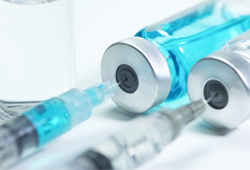 In response to the COVID-19 pandemic, the U.S. and many state governments have taken a number of steps to expand access to telehealth services and reduce other barriers to care. Among other things, the U.S. Centers for Medicare and Medicaid Services (CMS) has eliminated a number of restrictions on the coverage of telehealth services under Medicare to enable coverage of services provided to patients, including new patients, located in their homes. Many commercial payors have also taken action to expand access to telehealth, including by eliminating co-payments for such services. Many states have temporarily waived in-state licensure requirements to enable physicians, registered nurses, licensed practical nurses, nurse practitioners, and other medical personnel licensed in any state to provide telehealth services to their residents. The Department of Health and Human Services (HHS), Office of Inspector General (OIG) announced that physicians and other practitioners will not be subject to administrative sanctions for reducing or waiving any cost-sharing obligations Federal health care program beneficiaries may owe for telehealth services. The HHS Office for Civil Rights (OCR) additionally announced that during the pandemic, it will allow healthcare providers to provide telehealth services to patients through any non-public facing communication applications such as Apple FaceTime, Facebook Messenger, Google Hangout, and Skype. Finally, the Drug Enforcement Administration (DEA) and the Food and Drug Administration (FDA) have both taken steps in response to the COVID-19 pandemic to remove barriers restricting patient access to controlled substances and medicines. We review these developments below.
In response to the COVID-19 pandemic, the U.S. and many state governments have taken a number of steps to expand access to telehealth services and reduce other barriers to care. Among other things, the U.S. Centers for Medicare and Medicaid Services (CMS) has eliminated a number of restrictions on the coverage of telehealth services under Medicare to enable coverage of services provided to patients, including new patients, located in their homes. Many commercial payors have also taken action to expand access to telehealth, including by eliminating co-payments for such services. Many states have temporarily waived in-state licensure requirements to enable physicians, registered nurses, licensed practical nurses, nurse practitioners, and other medical personnel licensed in any state to provide telehealth services to their residents. The Department of Health and Human Services (HHS), Office of Inspector General (OIG) announced that physicians and other practitioners will not be subject to administrative sanctions for reducing or waiving any cost-sharing obligations Federal health care program beneficiaries may owe for telehealth services. The HHS Office for Civil Rights (OCR) additionally announced that during the pandemic, it will allow healthcare providers to provide telehealth services to patients through any non-public facing communication applications such as Apple FaceTime, Facebook Messenger, Google Hangout, and Skype. Finally, the Drug Enforcement Administration (DEA) and the Food and Drug Administration (FDA) have both taken steps in response to the COVID-19 pandemic to remove barriers restricting patient access to controlled substances and medicines. We review these developments below.
Read the Alert >>
 The COVID-19 pandemic is continuing to cause major global disruption to the activities of development stage and other life sciences companies due to, among other factors, limited or no access to clinical trial sites, reduced supply levels for active pharmaceutical ingredients or other key materials needed to make drug candidates or medical devices, and the inability of personnel to access laboratory and other specialized work spaces.
The COVID-19 pandemic is continuing to cause major global disruption to the activities of development stage and other life sciences companies due to, among other factors, limited or no access to clinical trial sites, reduced supply levels for active pharmaceutical ingredients or other key materials needed to make drug candidates or medical devices, and the inability of personnel to access laboratory and other specialized work spaces. The Coronavirus Aid, Relief, and Economic Security Act (“CARES Act”), which was enacted on March 27, 2020, created new programs and expanded existing programs in ways that significantly affect the options for employers. This alert identifies key aspects of the CARES Act that can affect employers’ decisions in managing payroll costs during this challenging period. This alert also reviews other considerations for employers, including federal and state plant closing laws and Fair Labor Standards Act (“FLSA”) requirements. This alert focuses on considerations based on federal law and the laws of California, Massachusetts and New York.
The Coronavirus Aid, Relief, and Economic Security Act (“CARES Act”), which was enacted on March 27, 2020, created new programs and expanded existing programs in ways that significantly affect the options for employers. This alert identifies key aspects of the CARES Act that can affect employers’ decisions in managing payroll costs during this challenging period. This alert also reviews other considerations for employers, including federal and state plant closing laws and Fair Labor Standards Act (“FLSA”) requirements. This alert focuses on considerations based on federal law and the laws of California, Massachusetts and New York. The ongoing global outbreak of the novel coronavirus (COVID-19) raises important considerations for life sciences companies subject to U.S. Securities and Exchange Commission (“SEC”) disclosure and reporting requirements. As the pandemic continues to disrupt markets and industries worldwide, companies should carefully assess the risks that COVID-19 poses to their operations, ensure that those risks are accurately reflected in their SEC filings and investor communications, and carefully consider their disclosures to investors as COVID-19 risks rapidly evolve each day.
The ongoing global outbreak of the novel coronavirus (COVID-19) raises important considerations for life sciences companies subject to U.S. Securities and Exchange Commission (“SEC”) disclosure and reporting requirements. As the pandemic continues to disrupt markets and industries worldwide, companies should carefully assess the risks that COVID-19 poses to their operations, ensure that those risks are accurately reflected in their SEC filings and investor communications, and carefully consider their disclosures to investors as COVID-19 risks rapidly evolve each day. Late Wednesday night, March 25, 2020, the U.S. Senate passed, 96-0, the “Coronavirus Aid, Relief, and Economic Security Act” or “CARES Act” (H.R. 748), which will make available to small businesses $349 billion in “paycheck protection loans” through the U.S. Small Business Administration’s 7(a) Loan Guaranty Program (Paycheck Protection Loans or PPLs) and $10 billion in economic injury disaster loan grants (EIDL Grants). The bill is now before the U.S. House of Representatives, where it is expected to pass in substantially its current form. Below is a summary of the bill as it currently stands with respect to the Paycheck Protection Loan program.
Late Wednesday night, March 25, 2020, the U.S. Senate passed, 96-0, the “Coronavirus Aid, Relief, and Economic Security Act” or “CARES Act” (H.R. 748), which will make available to small businesses $349 billion in “paycheck protection loans” through the U.S. Small Business Administration’s 7(a) Loan Guaranty Program (Paycheck Protection Loans or PPLs) and $10 billion in economic injury disaster loan grants (EIDL Grants). The bill is now before the U.S. House of Representatives, where it is expected to pass in substantially its current form. Below is a summary of the bill as it currently stands with respect to the Paycheck Protection Loan program. U.S. companies may see opportunities to increase collaborations amongst one another during the current pandemic, but should be aware that they are still subject to the antitrust laws.
U.S. companies may see opportunities to increase collaborations amongst one another during the current pandemic, but should be aware that they are still subject to the antitrust laws. While COVID-19 will affect the operations of different companies in different ways, the boards of directors of every company should think critically about their oversight role in the context of this unprecedented global pandemic. Here are some things to remember based on the intersection of the pandemic with directors’ duties.
While COVID-19 will affect the operations of different companies in different ways, the boards of directors of every company should think critically about their oversight role in the context of this unprecedented global pandemic. Here are some things to remember based on the intersection of the pandemic with directors’ duties. As the COVID-19 pandemic unfolds, our drug, biologic, and medical device clients conducting or planning to conduct clinical trials may be faced with challenges related to quarantines, travel limitations, site closures or access restrictions, infection transmission concerns of site research personnel and study subjects, and supply chain interruptions. Nonetheless, it remains critical during the COVID-19 pandemic to continue to assure the safety of trial participants, comply with good clinical practice (GCP) requirements, and minimize risks to trial integrity. In this client alert which follows our earlier article on product development considerations for COVID-19 and article on FDA scrutiny of COVID-19 medical product marketing, we briefly discuss the impact the COVID-19 pandemic may have on our life sciences clients, and we provide an overview of FDA’s “Guidance on Conduct of Clinical Trials of Medical Products during COVID-19 Pandemic” issued on March 18, 2020.
As the COVID-19 pandemic unfolds, our drug, biologic, and medical device clients conducting or planning to conduct clinical trials may be faced with challenges related to quarantines, travel limitations, site closures or access restrictions, infection transmission concerns of site research personnel and study subjects, and supply chain interruptions. Nonetheless, it remains critical during the COVID-19 pandemic to continue to assure the safety of trial participants, comply with good clinical practice (GCP) requirements, and minimize risks to trial integrity. In this client alert which follows our earlier article on product development considerations for COVID-19 and article on FDA scrutiny of COVID-19 medical product marketing, we briefly discuss the impact the COVID-19 pandemic may have on our life sciences clients, and we provide an overview of FDA’s “Guidance on Conduct of Clinical Trials of Medical Products during COVID-19 Pandemic” issued on March 18, 2020.